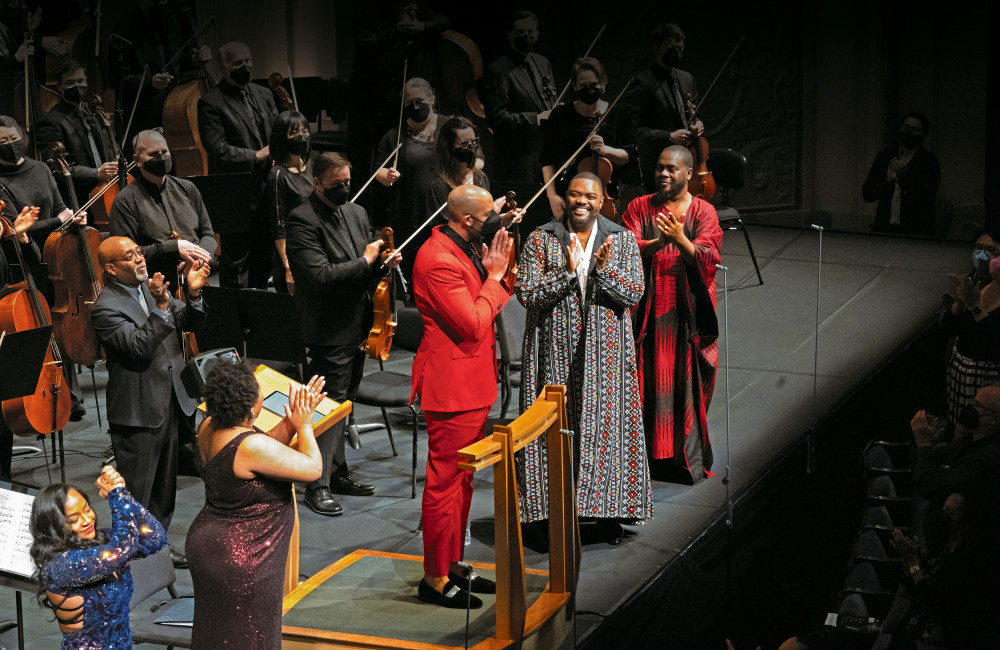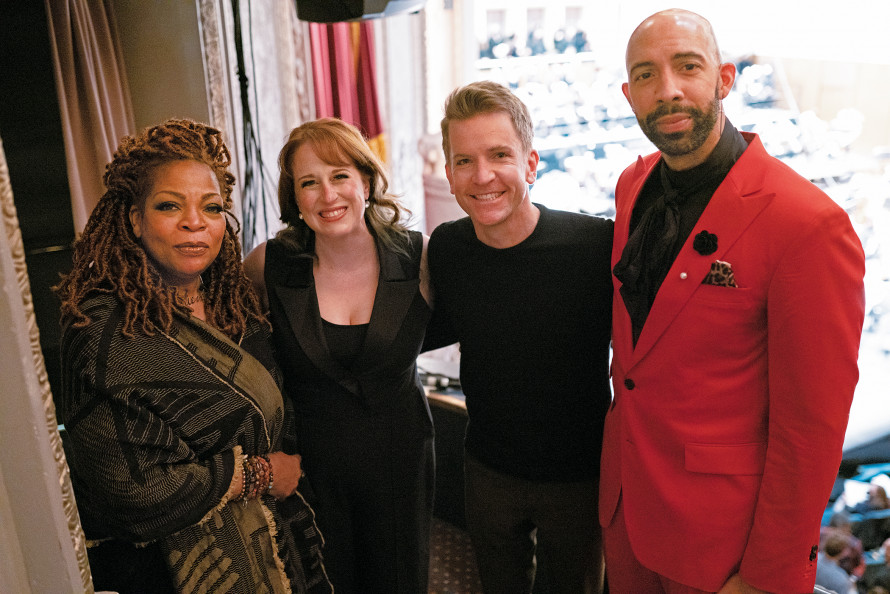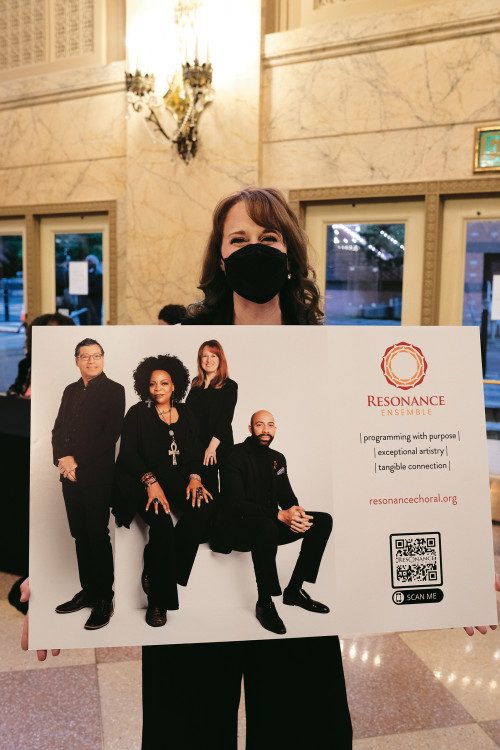Confronting Racial Violence Through Music
Portland’s Resonance Ensemble, led by Professor Kathy FitzGibbon, worked with artist-composer Damien Geter to present An African American Requiem, a bold, thought-provoking musical response to violence against African Americans in the United States.
Rachel Hadiashar
by Hanna Merzbach BA ’20
It was New Year’s Eve 2016 when artist-composer Damien Geter sent Kathy FitzGibbon a text. Geter had been wanting to create a musical composition in response to the 2016 U.S. presidential election and the rise in racial violence against African Americans. A light bulb had finally gone off.
“All of a sudden, I had an idea that I should write a requiem mass that was devoted to victims of racial violence in the country,” he remembers. Traditionally, a requiem is a Catholic mass, concert, or other religious service where music is performed to honor the deceased.
It didn’t take long for FitzGibbon, professor of music and director of choral activities at Lewis &Clark, to sign on. In fact, the next day, FitzGibbon agreed to commission the performance as the artistic director of the Resonance Ensemble, a Portland-based vocal group that works to promote social change.
“It just felt like something that was so needed,” FitzGibbon says. “I told Damien, ‘Yes, I will do anything in my power to help bring this to life.’ ” More than five years later, after a two-year delay due to the COVID-19 pandemic, An African American Requiem premiered at the Arlene Schnitzer Concert Hall in Portland in early May. About 25 L&C students, alumni, and faculty performed in the choir or orchestra.
“It definitely felt like there was huge representation from Lewis & Clark,” FitzGibbon says. “The piece meshes so beautifully with what a lot of our L&C community members aspire to do: to create art that makes the world a better place.”
The Lewis & Clark performers were among the more than 130 people who made the performance a reality. In addition to the vocalists from Resonance Ensemble and other area choirs, FitzGibbon also reached out to the Oregon Symphony, who partnered with the choir in presenting the premiere Geter says this kind of collaboration was essential for bringing the show to fruition.
“You can write the notes, but it’s nothing but a piece of paper until people bring it to life,” Geter says.
The performance’s impact stretched far beyond the walls of the Arlene Schnitzer Concert Hall. All Classical Portland and New York City’s WQXR-FM broadcast the premiere live to radio listeners. In late May, members of Resonance Ensemble performed the Requiem again at the Kennedy Center in Washington, D.C., with the Choral Arts Society of Washington.
“At the premiere, there was a sense that this was the culmination of work from people all across the country,” FitzGibbon says. For example, among the Requiem performers were two L&C alumni who live in Atlanta. They practiced virtually and flew into Portland for the performance.
According to FitzGibbon, An African American Requiem is “part of a grand tradition of requiems but is deeply personalized.” In addition to standard Latin requiem texts, the 75-minute concert included African American spirituals and texts from civil rights activists Ida B. Wells and Jamilia Land, along with movements dedicated to Eric Garner and George Floyd’s last words, “I can’t breathe.” The performance concluded with poetry from African American poet and Portland resident S. Renee Mitchell.
Geter says that the piece was originally supposed to be only four or five movements; instead, it was 20 and included a much bigger orchestra then he had originally envisioned.
“As I kept writing,” he says, “it all just kept unfolding.”
A World Premiere
Before the Portland performance even started, an electric buzz filled the concert hall. Then, all went silent, and four Black opera soloists walked onto the stage, wearing floor-length sequined gowns and long robes with African prints. To FitzGibbon, they looked like royalty.
“Damien just gasped and started shouting, ‘Yes, yes!’ and I burst into tears,” she remembers. “The performers were met with a standing ovation before the music even began.”
Rachel Hadiashar
Credit:
“ His compositional star is rising. I think a lot of people are hearing about his work and its emphasis on social justice and reimagining our society. His work is so thought-provoking in that way.”
Professor Kathy FitzGibbon
The energy of the crowd that night was unlike anything FitzGibbon had experienced before, with the audience audibly gasping throughout the performance. At one point, the performers played a mournful rendition of “The Star Spangled Banner” and went silent instead of singing the word “free” in the iconic line, “land of the free.”
“That is one of these moments where I just heard these intakes of breath from the entire audience as they realized the statement being made… ‘Oh right, not everyone is free,’” FitzGibbon recalls.
“The audience response was pretty powerful,” Geter agrees.
In moments like this, Black audience members and performers said they felt more represented in music than they ever had before. FitzGibbon says that one African American audience member compared her experience to being at a Black church. And for Negasi Brown BA ’23, a theatre major who sang bass in the performance, singing in the choir was a transformative experience.
“I have been in choirs since my sophomore year of high school, and never have I felt more seen by a performance,” Brown says. “I found it hard to hold back tears when the show ended, seeing those four amazing Black soloists take their final bows and imagining that it could actually be me up there one day.”
As a Black person, Brown says the performance felt deeply personal. At one point in the Requiem, Brown notes, a loud police siren blares above the music of the orchestra, hitting on the theme of police brutality against African Americans.
“I’m Black, and I’m someone who’s afraid of police brutality,” Brown says. “To have an expansive requiem written to understand that kind of fear, but also to experience it through the camaraderie of choral music, was truly a transformative and eye-opening experience, especially as an artist who wants to do similar work.”
At the end of the piece, the audience’s standing ovation lasted more than 10 minutes, a testament to the piece’s power and impact. The Requiem showed Brown that there’s room for—and a profound need for— art like this that focuses on the Black experience.
“As a Black performer and as a Black creator, knowing that there is this level of support for art that’s representative of the Black experience gives me hope that this is something I could do in the future,” says Brown.
Donna Dermond MA ’89, now the chair of the Resonance Ensemble board, sang alto in the Requiem. She says it’s the most important piece she’s sung in her 60 years of performing.
“The composition is beautiful, indeed, but its purpose and content affected me profoundly,” Dermond says. “I consider it a privilege to have sung such a work.”
Engaging the Community
Leading up to the performance, engaging African American communities in Portland was a top priority. Resonance Ensemble always works with community partners for its concerts, so in keeping with that tradition, the group sought to pull in people on the ground doing work around racial violence.
“We had the sense that there were a lot of community stakeholders,” says FitzGibbon. “How do we make sure that we amplify the impact within the African American community, and also how do we make it not just a one-off performance?”
FitzGibbon and her colleagues decided to create an advisory committee with community organizations. The committee eventually brought together leaders like S. Renee Mitchell, the poet who performed the final movement in the premiere, and others from nonprofit organizations, Portland Public Schools, and religious communities. The two-year delay gave the committee more time to engage African American communities and ensure the piece would resonate with its members.
These conversations extended into the coursework at Lewis & Clark. During spring semester 2022, FitzGibbon devoted an entire unit of her first-year seminar course, Culture and the Concert Hall, to studying An African American Requiem and analyzing how classical music is shifting in regard to race, gender, and class. Geter, the composer, even came to a class to discuss his work.
“The students felt that they were a part of music history being made,” FitzGibbon said. “It was fun to feel that my teaching and professional creative work were so aligned.”
In addition, ahead of the first performance, FitzGibbon and others prepared an educational curriculum and video series about the tradition of requiems and the history of Black Americans in Portland and beyond.
“You can write the notes, but it’s nothing but a piece of paper until people bring it to life,”
Composer Damien Geter

“She talked about how this performance might bring up difficult feelings, and provided some breathing exercises for use during the concert,” says FitzGibbon.
At the world premiere in Portland, hundreds of students from the metro area filled the audience, thanks, in part, to an anonymous donor who purchased tickets for many young people and families of color. Geter was proud to see the people for whom he had written the piece were well represented in the audience.
“For me, that’s what this piece is about,” Geter says. “I think it’s one of my proudest moments.”
The educational curriculum will live on as the Requiem travels, FitzGibbon says. She expects it to be distributed to area schools in advance of future performances. The curriculum has already been used in Washington, D.C, where the Requiem was performed at the Kennedy Center in May. It will also be shared with schools in Fort Worth, Texas, where the piece will be performed January 28, 2023, with the Fort Worth Opera Chorus and the Fort Worth Symphony Orchestra.
The Requiem is just one of the many projects Geter has on the books. He’s also composing two operas, American Apollo and Loving v. Virginia. “His compositional star is rising,” FitzGibbon says. “I think a lot of people are hearing about his work and its emphasis on social justice and reimagining our society. His work is so thought-provoking in that way.”
FitzGibbon is currently helping produce a commercial recording of the Washington, D.C., performance of An African American Requiem, which will be available for streaming in 2023. For now, a recording of the Portland premiere is available through PRX Exchange, so radio stations across the country can broadcast the performance. As FitzGibbon says, “We look forward to bringing the music and themes of the Requiem to a larger audience.” ■
Hanna Merzbach BA ’20 is a journalist based in Jackson, Wyoming.
More L&C Magazine Stories
Lewis & Clark Magazine is located in McAfee on the Undergraduate Campus.
MSC: 19
email magazine@lclark.edu
voice 503-768-7970
fax 503-768-7969
The L&C Magazine staff welcomes letters and emails from readers about topics covered in the magazine. Correspondence must include your name and location and may be edited.
Lewis & Clark Magazine
Lewis & Clark
615 S. Palatine Hill Road MSC 19
Portland OR 97219

